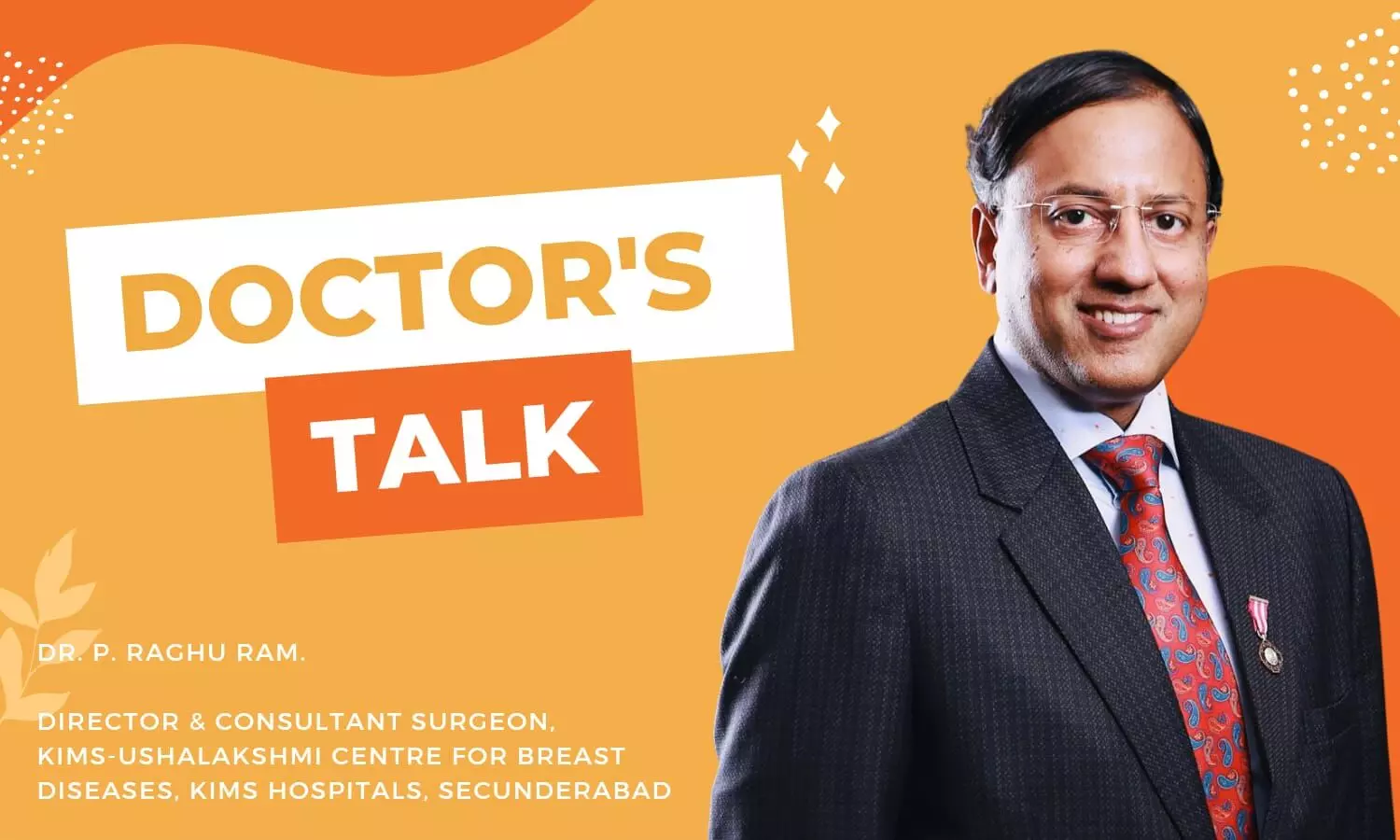Interview: Dr P Raghu Ram discusses about Breast awareness & advances in Breast Cancer treatment
The Padma Sree awardee completed his MBBS and MS from India and pursued higher studies in the United Kingdom. He has obtained his FRCS from the United Kingdom.
By Sumavarsha kandula
In a conversation with Dr. P Raghu Ram, director and consultant surgeon, KIMS-USHALAKSHMI Centre for Breast Diseases, KIMS Hospitals, NewsMeter tried to learn more about the impact of awareness and new developments in the field of breast health.
The Padma Sree awardee completed his MBBS and MS from India and pursued higher studies in the United Kingdom. He has obtained his FRCS from the United Kingdom.
Speaking about why he moved back to India and started actively working on breast health awareness, he says, "When my mother got breast cancer, I looked for options for chemo in India. I found a lack of understanding and an absence of screening programmes. Secondly, I realised we didn't have any dedicated breast centers here, like not just a cancer center but a center dedicated to managing breast diseases where both benign non-cancer problems and breast cancer are dealt with. The third thing I realised is we had very few specialists who deal exclusively with breast cancer."
On creating an umbrella body for breast health, he says, "Surgical oncologists perform only 10% of breast cancer procedures. I wanted to bring together general surgeons, surgical oncologists, and plastic surgeons concerned with breast disease management under one Organisaton such as The Association of Breast Surgeons in the UK."
A recent Mumbai study found that clinical breast examinations performed every two years by primary health workers significantly reduced the stage of breast cancer at diagnosis. It also resulted in a nonsignificant 15% reduction in overall breast cancer mortality (but a significant reduction of nearly 30% in mortality in women over 50).
'Pink Ribbon' and awareness campaigns
When asked about the "Pink Ribbon" campaign and other awareness programmes, Dr. Raghu Ram says, "The pink ribbon stands for breast cancer awareness and the pink ribbon campaign. So, over the past 15 years, the foundation has been working relentlessly to break the taboo associated with breast cancer. We kick-started the campaign in October 2007. Apart from that, I've worked with the governments of both Telugu states to help awareness reach the grassroots."
He adds, "We conducted a mass screening in about 4,000 villages. We started publishing booklets in English and Telugu about every aspect of breast health, explaining them in a simple, easy-to-understand format. We also launched an app called 'ABC of breast health' where we transcribed all the information available about breast health in 12 commonly spoken Indian languages. If you pick up breast cancer early, we can effectively cure the disease."
Latest advances in breast treatments
About advancements in treatment, Dr. Raghu Ram says, "Let me talk about surgery because breast cancer is a multi-modality treatment. The primary five treatment modalities are surgery, chemotherapy, radiotherapy, hormone therapy, and targeted therapy."
In surgery, there are certain developments. When someone has breast cancer, the surgical treatment involves surgery to the breast and armpit, to the lymph nodes in the armpit. In surgery to the breast, there are two options—one is a mastectomy, which is the removal of the breast. This is radical and can profoundly impact the woman and cause psychological issues. The other is breast conservation, that is, we do a lumpectomy or wide local excision where we remove the lump with an area of normal tissue around," he adds
He explains that the latest advances are when you remove the lump, when there is bound to be a defect in the breast. "To cover breast defects, techniques have evolved over the past 20 years called oncoplastic breast surgery, which combines oncological principles with plastic surgical principles.
All the lymph nodes used to be removed. Even now, it might be required to be done if the lymph nodes are involved in cancer," he adds.
Dr. Raghu Ram says that when the cancer is picked up early, the chances of lymph node involvement are meager. "There is a minimally invasive technique where we do a sentinel node biopsy and inject dye near the nipple. We make a small incision in the armpit during the surgery and remove one or two lymph nodes. When the woman is under anesthesia, we subject these nodes to a frozen section. We check if the nodes are affected, and based on that, we remove the nodes or not. This will further reduce the side effects," he explains.
When a breast has to be removed, the breast can be reshaped. "That is called breast reconstruction. This can be done simultaneously as breast surgery or in a delayed setting. If somebody requires radiotherapy, there is likely to be a lot of tissue damage to the area near the chest. So, we recommend they wait till the treatments are all over in that case. In this day and age of oncoplastic breast surgery, there must be a minimal defect in the breast where surgery is done," says Dr. Raghu Ram.
"Plastic breast surgery has revolutionised conserving breasts. Minimally invasive techniques, not laparoscopic, but minimally invasive means with less trauma have helped a lot," he adds.
Early detection
On the direct implications of awareness of early detections, he says, "Though it is not exponential, or as much as we wished for, there's been a steady improvement. Because of early detection combined with advanced treatments, more and more women have a longer life and a good quality of life."
He adds, "During the pandemic, people did not go for regular screenings, so breast cancer and other cancers have also been reported at later stages."